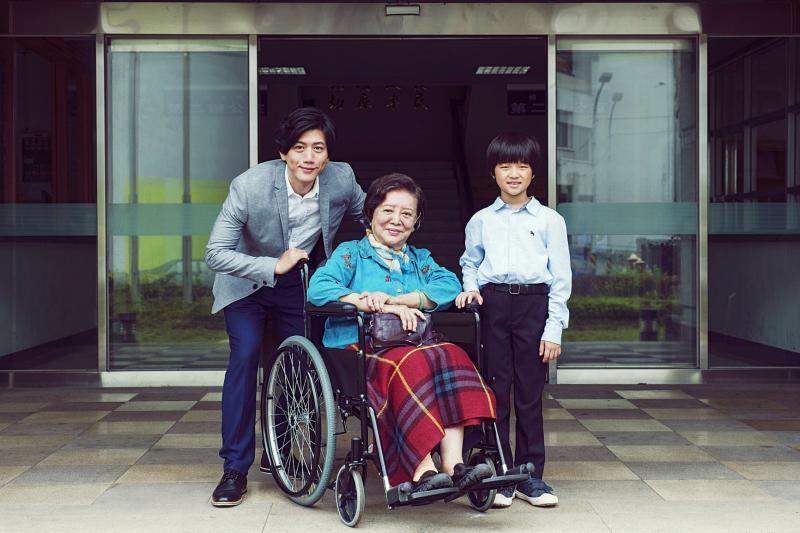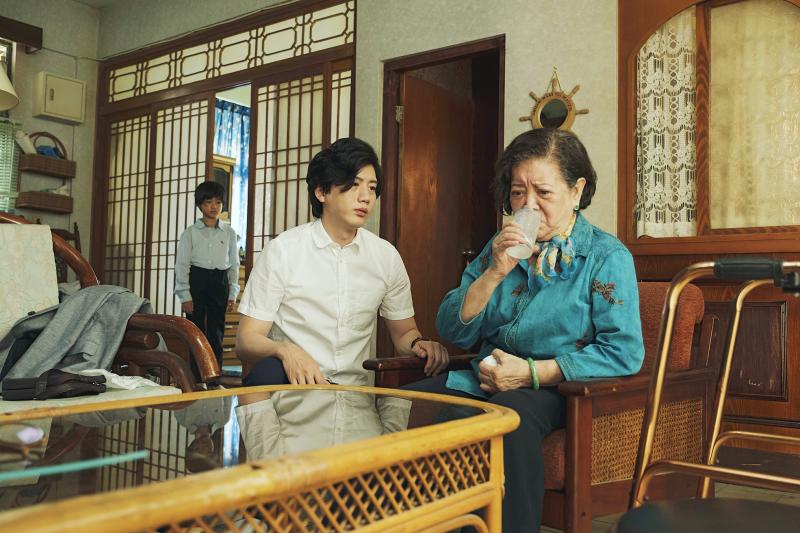It seems like slow-burning, suffocating family dramas of despair, sorrow and redemption are in fashion in Taiwanese cinema these days. It worked with films like last year’s Golden Horse darling A Sun (陽光普照) and July’s Wild Sparrow (野雀之詩), but not every production warrants this treatment.
It’s not that Dear Tenant (親愛的房客) isn’t deserving of its six Golden Horse nominations. The story of a gay man selflessly caring for his dead lover’s elderly mother and young son tenderly explores the limits of unconditional love and the judgment and misunderstanding society still exhibits towards homosexuality — and from a man who isn’t directly related to the family.
“If I were a woman, and my husband died but I stayed with his family to care for them, would you be asking the same questions?” Chien-yi (Mo Tzu-yi, 莫子儀) asks in one scene.

Photo courtesy of Activator Marketing Company
Not only does nobody understand why he’s doing what he’s doing — even after he reveals the details of the relationship — he’s being accused of murdering his late partner’s mother (Chen Shu-fang, 陳淑芳) and adopting the son (Pai Run-yin, 白潤音) to claim their house and property.
Chien-yi’s lingering love and regret toward his lost love is apparent and easily understandable, but his relationship with the mother and son are much more complex and even more moving as the parties grapple with their feelings toward each other. On the surface, he’s just a tenant, but there’s so much bubbling underneath. Besides these different faces of love, the film also tackles jealousy, forgiveness and ultimately, setting oneself free.
Director Cheng Yu-chieh (鄭有傑) treats Chien-yi’s struggles and subdued emotionality with great care. The homosexuality is not overstated or intentionally highlighted, its more just a matter of fact, an essential part of the tale Cheng is trying to tell. The discrimination Chien-yi faces is not overt, but deeply ingrained in Taiwan’s patriarchal society and it’s these constant microagressions stemming from a lack of education and understanding that often hurt the most.

Photo courtesy of Activator Marketing Company
The bleak cinematography and use of a minimal soundtrack with much silence fits Chien-yi’s immensely restrained, yet passionate, personality well, and Mo delivers a delicate, nuanced performance that hits just the right notes for his role. He fully deserves his Best Actor award at July’s Taipei Film Festival.
Chen and Pai are no slouches either, with Pai echoing Mo’s persona, deftly portraying a shy and reserved kid who is emotionally intelligent and wise beyond his years. Whether he is aware of the relationship between Chien-yi and his father doesn’t matter as long as they love him, and it’s an acute statement in a society that is still arguing about LGBTQ education in schools and whether same-sex couples should raise children.
Chen’s character is sick and in constant pain, and misses her deceased son dearly, but she still manages not to seem pitiful and retains her dignity, which is also not easy to convey.
The problem is that despite the complex themes and original topic, the story is actually rather straightforward and it’s not hard to guess what really happened despite Cheng dragging the scenes out to create a sense of suspense. Some sections go on for what seems like forever while the results are already painfully obvious, although there is one twist that is worth the wait.
While this treatment is atmospheric and adds to the characters’ anguish and desperation, it sacrifices intensity and edge, and ultimately the attention of the less patient viewers. The story is still strong enough overall to keep most people in their seats, but a tighter edit would have kept the momentum going throughout such a powerful story.
Other than that one flaw, it’s a movie that’s well worth watching and probably will win big at next months’ Golden Horse Awards.

On April 26, The Lancet published a letter from two doctors at Taichung-based China Medical University Hospital (CMUH) warning that “Taiwan’s Health Care System is on the Brink of Collapse.” The authors said that “Years of policy inaction and mismanagement of resources have led to the National Health Insurance system operating under unsustainable conditions.” The pushback was immediate. Errors in the paper were quickly identified and publicized, to discredit the authors (the hospital apologized). CNA reported that CMUH said the letter described Taiwan in 2021 as having 62 nurses per 10,000 people, when the correct number was 78 nurses per 10,000

As we live longer, our risk of cognitive impairment is increasing. How can we delay the onset of symptoms? Do we have to give up every indulgence or can small changes make a difference? We asked neurologists for tips on how to keep our brains healthy for life. TAKE CARE OF YOUR HEALTH “All of the sensible things that apply to bodily health apply to brain health,” says Suzanne O’Sullivan, a consultant in neurology at the National Hospital for Neurology and Neurosurgery in London, and the author of The Age of Diagnosis. “When you’re 20, you can get away with absolute

May 5 to May 11 What started out as friction between Taiwanese students at Taichung First High School and a Japanese head cook escalated dramatically over the first two weeks of May 1927. It began on April 30 when the cook’s wife knew that lotus starch used in that night’s dinner had rat feces in it, but failed to inform staff until the meal was already prepared. The students believed that her silence was intentional, and filed a complaint. The school’s Japanese administrators sided with the cook’s family, dismissing the students as troublemakers and clamping down on their freedoms — with

As Donald Trump’s executive order in March led to the shuttering of Voice of America (VOA) — the global broadcaster whose roots date back to the fight against Nazi propaganda — he quickly attracted support from figures not used to aligning themselves with any US administration. Trump had ordered the US Agency for Global Media, the federal agency that funds VOA and other groups promoting independent journalism overseas, to be “eliminated to the maximum extent consistent with applicable law.” The decision suddenly halted programming in 49 languages to more than 425 million people. In Moscow, Margarita Simonyan, the hardline editor-in-chief of the